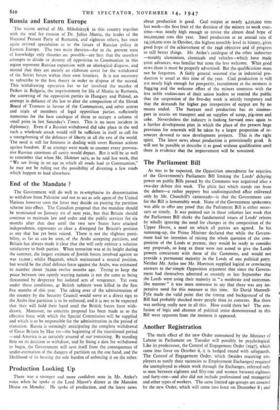Russia and Eastern Europe
" The recent arrival of Mr. Mikolajczyi in this country together with the trial for treason of Dr. Julius Maniu, the leader of the National Peasant Party of Rumania, and eighteen others, has once again revived speculation as to the future of Russian policy in Eastern Europe. The two main theories—for in the present state of knowledge only theories are possible—are first that the ceaseless attempts to divide or destroy all opposition to Communism in this region represent Russian expansion with an ideological disguise, and second that they are merely an elaborate cover for the withdrawal of the Soviet forces within their own frOntiers. It•is not necessary to subscribe to the first theory in order to dispose of the second. This withdrawing operation has so far involved the murder of Petkov in Bulgaria, the imprisonment for life of Maniu in Rumania, the scattering of the opposition parties in Hungary and Poland, an attempt in defiance of the law to alter the composition of the Slovak Board of Trustees in favour of the Communists, and other arrests and trials of members of legal opposition parties sufficiently numerous for the bare catalogue of them to occupy a column of small print in last Saturday's Times. This is no mere incident in diplomacy. Even if a Russian withdrawal did take place in the end such a wholesale attack would still be sufficient in itself to call for a strengthening of the defences of liberty in all the rest of the world. The need is still for firmness in dealing with overt Russian actions against freedom. If an attempt were made to counter every provoca- tive Russian statement all sanity would depart. But it will be as well to remember that when Mr. Molotov says, as he said last week, that " We are living in an age in which all roads lead to Communism," he may not be ruling out the possibility of diverting a few roads which happen to lead elsewhere.






























 Previous page
Previous page